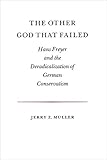The Other God that Failed : Hans Freyer and the Deradicalization of German Conservatism / Jerry Z. Muller.
Material type: TextPublisher: Princeton, NJ : Princeton University Press, [2022]Copyright date: ©1988Description: 1 online resource (472 p.)Content type:
TextPublisher: Princeton, NJ : Princeton University Press, [2022]Copyright date: ©1988Description: 1 online resource (472 p.)Content type: - 9780691228259
- Conservatism -- Germany -- History -- 20th century
- Intellectuals -- Germany -- History -- 20th century
- National socialism
- Radicalism -- Germany -- History -- 20th century
- Sociologists -- Germany -- Biography
- Sociology -- Germany -- History -- 20th century
- HISTORY / Europe / Germany
- Activism
- Adolf Hitler
- Antipathy
- Arnold Gehlen
- Bildung
- Bourgeoisie
- Capitalism
- Career
- Carl Schmitt
- Communism
- Contemporary society
- Criticism
- Critique
- Denazification
- Dilthey
- Disenchantment
- Ernst Forsthoff
- Ernst Troeltsch
- Ethics
- Ethos
- Explanation
- Far-right politics
- Federal republic
- Foreign policy
- Gemeinschaft and Gesellschaft
- Georg Simmel
- Gerhard Ritter
- Germans
- Gleichschaltung
- Habilitation
- Hans Freyer
- Hans-Georg Gadamer
- Helmut Schelsky
- Helmuth Plessner
- Historicism
- Historiography
- Ideology
- Institution
- Intellectual
- Intelligentsia
- Karl Mannheim
- Konrad Adenauer
- Lebensphilosophie
- Lecture
- Left-wing politics
- Liberal democracy
- Liberalism
- Martin Broszat
- Martin Heidegger
- Marxism
- Modernity
- Nazi Germany
- Nazi Party
- Nazism
- Of Education
- Pedagogy
- Philosopher
- Philosophy of history
- Philosophy
- Political philosophy
- Political science
- Politician
- Politics
- Positivism
- Privatdozent
- Publication
- Radical right (United States)
- Ralf Dahrendorf
- Religion
- Right-wing politics
- Romanticism
- Secularization
- Self-interest
- Social philosophy
- Social science
- Social theory
- Sociological theory
- Sociology
- Soziologie
- Suggestion
- Superiority (short story)
- Supporter
- Tatkreis
- Technology
- The God that Failed
- Theodor
- Theory
- Thought
- Totalitarianism
- Volksgeist
- Von
- Weimar Republic
- Welfare state
- Werner Sombart
- West Germany
- Wissenschaft
- World history
- World view
- Writing
- Émile Durkheim
- HM22.G3
- HM22.G3
- online - DeGruyter
| Item type | Current library | Call number | URL | Status | Notes | Barcode | |
|---|---|---|---|---|---|---|---|
 eBook
eBook
|
Biblioteca "Angelicum" Pont. Univ. S.Tommaso d'Aquino Nuvola online | online - DeGruyter (Browse shelf(Opens below)) | Online access | Not for loan (Accesso limitato) | Accesso per gli utenti autorizzati / Access for authorized users | (dgr)9780691228259 |
Frontmatter -- CONTENTS -- PREFACE -- ABBREVIATIONS AND CITATIONS -- INTRODUCTION -- CHAPTER ONE. Science as a Vocation, 1887–1914 -- CHAPTER TWO. War, Revolution, and Generational Mission, 1914—1920 -- CHAPTER THREE. Radical Conservatism as Social Theory, 1920–1925 -- CHAPTER FOUR. Ideology and Social Science in Freyer's Practice of Sociology, 1925—1933 -- CHAPTER FIVE. Ideology and Social Science in Freyer's Theory of Sociology, 1925—1933 -- CHAPTER SIX. Revolution from the Right: Theory, 1925-1933 -- CHAPTER SEVEN. Revolution from the Right: Practice, 1933–1935 -- CHAPTER EIGHT. The Dynamics of Disillusionment, 1935–1945 -- CHAPTER NINE. New Conservatism and a New Respectability, 1945–1961 -- CHAPTER TEN. Hans Freyer and the Fate of German Intellectual Conservatism, 1945–1985 -- APPENDIX: Variations on the Theme of “The Other God That Failed”: Ernst Forsthoff, Arnold Gehlen, and Hans Zehrer -- REFERENCES -- INDEX
restricted access online access with authorization star
http://purl.org/coar/access_right/c_16ec
Why did some of the "best and brightest" of Weimar intellectuals advocate totalitarian solutions to the problems of liberal democratic, capitalist society? How did their "radical conservatism" contribute to the rise of National Socialism? What roles did they play in the Third Reich? How did their experience of totalitarianism lead them to recast their social and political thought? This biography of Hans Freyer, a prominent German sociologist and political ideologist, is a case study of intellectuals and a "god that failed"--not on the political left, but on the right, where its significance has been overlooked. The author explores the interaction of political ideology and academic social science in democratic and totalitarian regimes, the transformation of German conservatism by the experience of National Socialism, and the ways in which tension between former collaborators and former opponents of National Socialism continued to mold West German intellectual life in the postwar decades.
Mode of access: Internet via World Wide Web.
In English.
Description based on online resource; title from PDF title page (publisher's Web site, viewed 29. Jun 2022)


